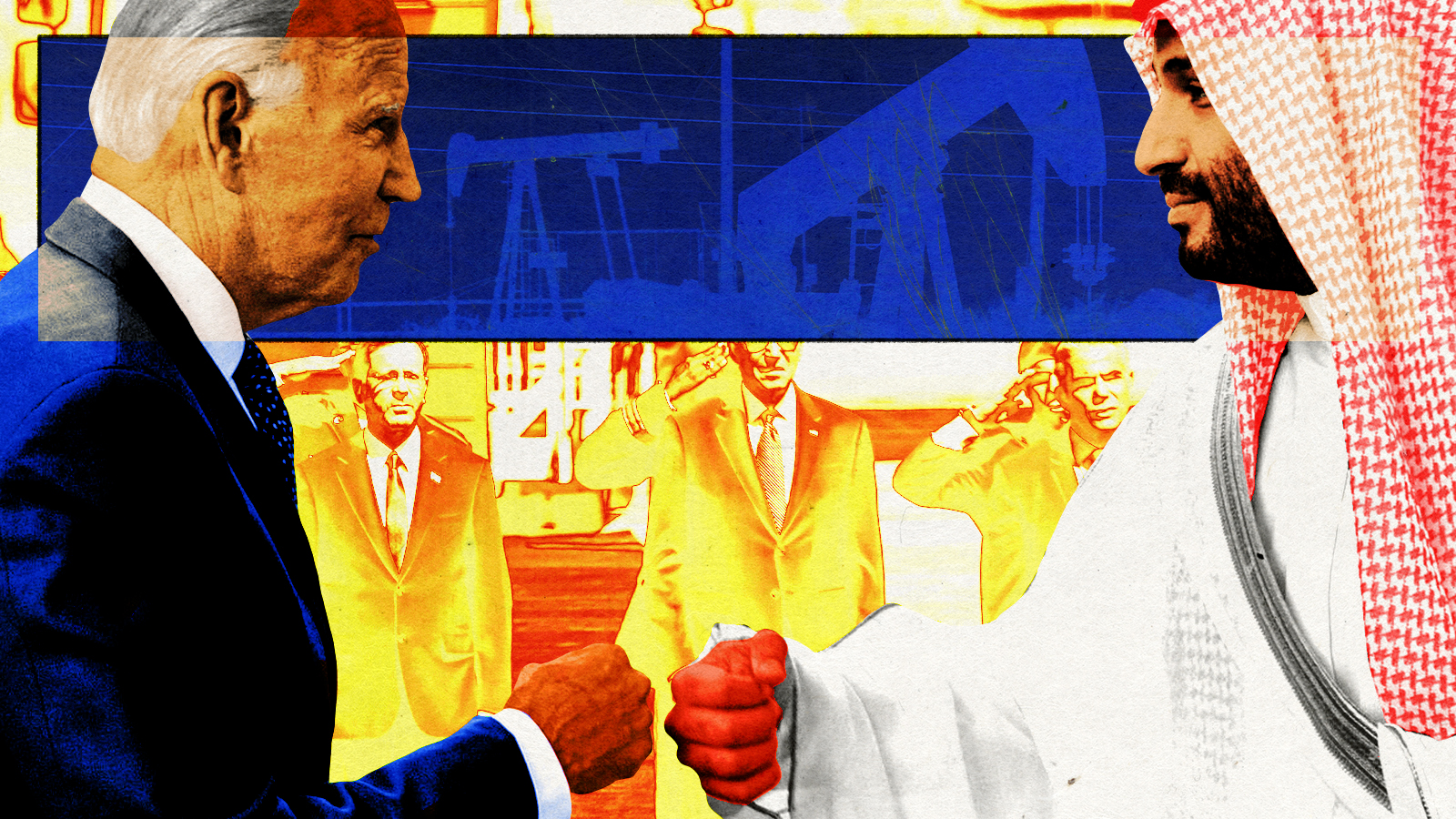What Biden did and didn't achieve while in the Middle East


A free daily email with the biggest news stories of the day – and the best features from TheWeek.com
You are now subscribed
Your newsletter sign-up was successful
President Biden returned on Saturday from a four-day trip to the Middle East, where he met with the leaders of Israel, Palestine, Saudi Arabia, and eight other Arab countries. The Saudi Arabian leg of the trip began controversially when Biden was photographed fist-bumping Saudi Crown Prince Mohammad bin Salman (MBS), the country's de facto leader who U.S. intelligence believes ordered the 2018 murder of journalist Jamal Khashoggi. But were the bad optics worth it? Here's everything you need to know:
Was Biden's trip a success?
Most analysts don't think so. Reuters reported that Biden failed to secure commitments from Saudi Arabia and other Arab countries on either of his top two priorities: increased oil production and a regional security alliance — including Israel — to counter the threat of Iran.
Per Reuters, the Saudis "poured cold water on U.S. hopes" when Foreign Minister Prince Faisal bin Farhan Al Saud "said he was not aware of any discussions on a Gulf-Israeli defense alliance and that the kingdom was not involved in such talks."
The Week
Escape your echo chamber. Get the facts behind the news, plus analysis from multiple perspectives.

Sign up for The Week's Free Newsletters
From our morning news briefing to a weekly Good News Newsletter, get the best of The Week delivered directly to your inbox.
From our morning news briefing to a weekly Good News Newsletter, get the best of The Week delivered directly to your inbox.
Market analyst Naeem Aslam told The Guardian that, by refusing to increase oil supply, OPEC — of which Saudi Arabia is by far the most influential member — had signaled that "the cartel isn't remotely interested in what Biden is trying to achieve."
Other critics saw Biden's fist bump with a serial human rights abuser like MBS as a blow to America's standing in the world that no diplomatic achievement could have justified. Sen. Bernie Sanders (I-Vt.) condemned the trip on Sunday, telling ABC This Week host Martha Raddatz that Saudi Arabia's "type of government" should not "be rewarded with a visit by the president of the United States."
During the Israeli leg of the trip, there wasn't much Biden could do. Israel's current prime minister, Yair Lapid, is only a placeholder until new elections can be held, though Biden did meet with once-and-likely-future PM Benjamin Netanyahu behind closed doors. Relations have also been strained by the death of journalist and American citizen, Shireen Abu Akleh, who may have been targeted by the Israeli military. The New York Times editorial board wrote that Biden "largely delivered what Israel wanted: a public statement" that the U.S. would, if necessary, use force to prevent Iran from acquiring nuclear weapons.
Did Biden confront MBS about Khashoggi's murder?
It depends who you ask. Biden claims he confronted the Saudi crown prince directly about Khashoggi's murder. "I raised it at the top of the meeting, making clear what I thought at the time and what I think of it now. I was straightforward and direct in discussing it. I made my view crystal clear," Biden told reporters. "[MBS] basically said that he was not personally responsible for it. I indicated that I thought he was."
A free daily email with the biggest news stories of the day – and the best features from TheWeek.com
But when asked whether Biden has accused MBS of complicity in Khashoggi's death, Saudi Minister of State for Foreign Affairs Adel al-Jubeir claimed he "didn't hear" any such exchange, though he said Biden had brought up the journalist's murder in more general terms as "an issue that has generated a lot of interest and concern in the U.S."
Farhan told reporters that the crown prince then "pointed out that the U.S. has made its own mistakes" — citing Abu Akleh's death and the torture of prisoners at Abu Ghraib prison in Iraq — and said that the kingdom "has taken the necessary action to hold those responsible accountable."
When Biden returned to the White House on Saturday, a reporter asked him if al-Jubeir was telling the truth. Biden's response was simple: "No." When asked if he regretted fist-bumping MBS, Biden appeared annoyed. "Why don't you guys talk about something that matters?" he asked.
Were there any positives?
Max Boot defended the trip in The Washington Post, writing that the meeting between Biden and MBS, while distasteful, is just the cost of doing business. Boot said he initially recoiled from the image of the president fist-bumping the crown prince but then remembered that "MBS is hardly the first, or even the worst, despot that U.S. presidents have greeted in similar ways. Harry Truman shook hands with Joseph Stalin, Richard Nixon with Mao Zedong — and both of those dictators had far more blood on their hands than MBS."
For Boot, the grand strategy calculus is simple: "If the United States won't support the Saudis, Russia and China will — and they will care far less about human rights than we do." We also need Saudi oil to run our economy and Saudi regional influence to counter Iran. Finally, Boot noted that although MBS is an authoritarian, he has taken steps — like letting women drive — to liberalize Saudi society.
Prominent Saudi journalist Abdulrahman al-Rashed was more optimistic about the meeting's results. In an op-ed for Al Arabiya, he wrote that the meeting between Biden and MBS "rekindled" Washington's "strategic relationship with Riyadh" after "nearly a decade of stalemate." al-Rashed particularly highlighted "the return of military cooperation and military sales," Biden's pledge to help the kingdom build a missile defense system, and an agreement to cooperate on cybersecurity and telecommunications.
Alexander Ward and Jonathan Lemire of Politico were similarly cheery. Biden's reputation as a champion of human rights took a hit, but in return, he got "historic agreements to bring Jerusalem and Riyadh closer together, a crown prince seemingly more open to ending the war in Yemen and a renewed push to solve the intractable conflict between Israelis and Palestinians," they wrote.
Grayson Quay was the weekend editor at TheWeek.com. His writing has also been published in National Review, the Pittsburgh Post-Gazette, Modern Age, The American Conservative, The Spectator World, and other outlets. Grayson earned his M.A. from Georgetown University in 2019.
-
 The environmental cost of GLP-1s
The environmental cost of GLP-1sThe explainer Producing the drugs is a dirty process
-
 Greenland’s capital becomes ground zero for the country’s diplomatic straits
Greenland’s capital becomes ground zero for the country’s diplomatic straitsIN THE SPOTLIGHT A flurry of new consular activity in Nuuk shows how important Greenland has become to Europeans’ anxiety about American imperialism
-
 ‘This is something that happens all too often’
‘This is something that happens all too often’Instant Opinion Opinion, comment and editorials of the day
-
 The ‘mad king’: has Trump finally lost it?
The ‘mad king’: has Trump finally lost it?Talking Point Rambling speeches, wind turbine obsession, and an ‘unhinged’ letter to Norway’s prime minister have caused concern whether the rest of his term is ‘sustainable’
-
 The billionaires’ wealth tax: a catastrophe for California?
The billionaires’ wealth tax: a catastrophe for California?Talking Point Peter Thiel and Larry Page preparing to change state residency
-
 Bari Weiss’ ‘60 Minutes’ scandal is about more than one report
Bari Weiss’ ‘60 Minutes’ scandal is about more than one reportIN THE SPOTLIGHT By blocking an approved segment on a controversial prison holding US deportees in El Salvador, the editor-in-chief of CBS News has become the main story
-
 Memo signals Trump review of 233k refugees
Memo signals Trump review of 233k refugeesSpeed Read The memo also ordered all green card applications for the refugees to be halted
-
 Has Zohran Mamdani shown the Democrats how to win again?
Has Zohran Mamdani shown the Democrats how to win again?Today’s Big Question New York City mayoral election touted as victory for left-wing populists but moderate centrist wins elsewhere present more complex path for Democratic Party
-
 Millions turn out for anti-Trump ‘No Kings’ rallies
Millions turn out for anti-Trump ‘No Kings’ ralliesSpeed Read An estimated 7 million people participated, 2 million more than at the first ‘No Kings’ protest in June
-
 Democrats: Harris and Biden’s blame game
Democrats: Harris and Biden’s blame gameFeature Kamala Harris’ new memoir reveals frustrations over Biden’s reelection bid and her time as vice president
-
 ‘We must empower young athletes with the knowledge to stay safe’
‘We must empower young athletes with the knowledge to stay safe’Instant Opinion Opinion, comment and editorials of the day
